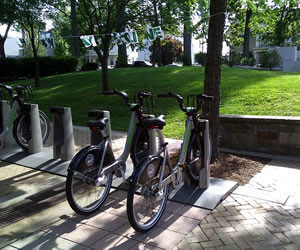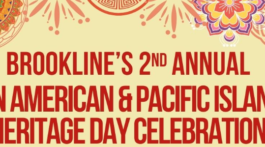 Brookline is putting their “spoke” in the ring to become a League of American Bicyclists’ “Bike Friendly Community.” This is Brookline’s first entry in the competition, with past winners from the metropolitan area including Boston, Somerville, Arlington, Newton, and Cambridge. Cynthia Snow, the President of the Brookline Bicycle Advisory Committee, stressed that just the act of applying for the special citation would be beneficial to Brookline cyclists.
Brookline is putting their “spoke” in the ring to become a League of American Bicyclists’ “Bike Friendly Community.” This is Brookline’s first entry in the competition, with past winners from the metropolitan area including Boston, Somerville, Arlington, Newton, and Cambridge. Cynthia Snow, the President of the Brookline Bicycle Advisory Committee, stressed that just the act of applying for the special citation would be beneficial to Brookline cyclists.
“It helps communities identify ways to improve cycling so it’s not just a recognition program but also provides guidance and encouragement,” said Ms. Snow by email. According to Snow, Brookline will be evaluated on safety, education, availability of bicycle planning and facilities.
“The goal of our efforts is to make cycling better and more accessible for everyone.”
Brookline has already made strides to improve their bike-friendly status. The Boston-based bicycling sharing program Hubway has bicycles stationed in Brookline Village on Station Street, near Town Hall on Washington Street, in Coolidge Corner on Beacon Street at Centre Street, and at JFK Crossing at Harvard and Thorndike Streets.
According to the BBAC’s 2012 Green Routes Bicycle Network Plan, there are also more bike racks in commercial areas, additional bike lanes and shared lane markings on Longwood Avenue and Washington Streets, and contraflow lanes and cycle tracks on Netherlands and Parkway Roads. Drivers who block bike lanes with their vehicles are subject to a $50 fine.
Although these improvements are important, Brookline (and, in fact, all communities in the United States) still has a long way to go to catch up to forward-thinking European cities like Copenhagen and Vienna. John Coulbourn, an avid cyclist who works at Cleverhood making stylish and functional bike capes for men and women, recently attended the Velo-City Conference in Vienna, Austria. He was inspired by the way the city was responding to “global challenges such as climate change, peak oil, and the international exchange of ideas and trade” through their innovative bicycle culture. According to Coulbourn, bikes comprise about 8% of trips taken in Vienna and they’re shooting to increase that to 10% by 2015. Compare that to the 1% of trips taken by bicycle in New York City.
“Infrastructure is critical,” Coulbourn said by phone, “developing bike lanes depends on how your streets operate.” Brookline has many quiet side streets—partly due to the strict parking regulations—but they are not connected in such a way that they facilitate cross-town travel. According to the Green Routes Bicycle Network Plan, the bicycle lanes on Beacon and Harvard Streets “disappear at intervals, leaving cyclists in heavy traffic. Bike lanes barely clear the ‘door zone’ of high turnover parking lanes.”
Improving bicycle safety in Brookline will require some sacrifices from residents and the necessity to look at the big picture. It would mean fewer parking spaces and car lanes. But the benefits of these changes are hard to ignore.
“When I ride a bike I feel joy compared to sitting in traffic!” John Coulbourn said. “Biking is good for cities, it alleviates frustrations, gets people moving with more ease. Brookline is an ideal spot for more cyclists, with its great local businesses and accessibility to Boston.”
“Young people are realizing that it’s not cost-effective to have a car. More people are getting bikes and using Zipcars when they need them.”
–Jennifer Campaniolo








